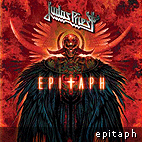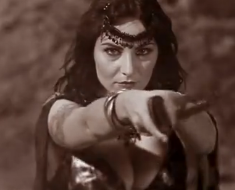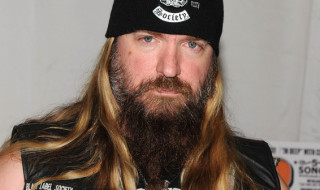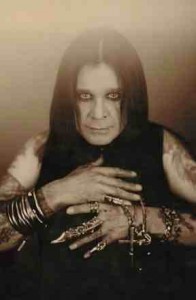
Back around May 2011, Rob Halford and his bandmates in Judas Priest announced it was undertaking its final world tour. Sadness filled hearts, tears flowed, but their decision was final. To celebrate this landmark, the band released “Epitaph,” a DVD filmed at the Hammersmith Appolo London on the final night of the group’s 50-week Epitaph World Tour. Here’s a really nice interview that Ultimate Guitar conducted with the metal legend:
UG: The “Epitaph” DVD perfectly captured what Judas Priest has created these past 40+ years. Do you have any sense of why the band has been able to persevere through all the different styles in metal?
Rob Halford: I don’t think any musician appreciates or understands the prospect of longevity. We’ve said many, many times more often than not it reflects on the chemistry and coming into each other’s lives as people and musicians. The magic started to happen particularly in songwriting. I think the base of it all and the thing that’s holding everything is the songs that you write. So that’s gotta be the major component.
The songs are always more important than anything else.
 If you look at the Stones who just played recently and are starting off their 50th anniversary and tour, your brain immediately starts going through all of their songs they’ve written. I think that’s pretty much the same with any band that’s had the good luck and good fortune of getting a life in rock and roll to go on a long journey. I really feel that the core of the whole existence of Priest is without a doubt the songs we’ve written.
If you look at the Stones who just played recently and are starting off their 50th anniversary and tour, your brain immediately starts going through all of their songs they’ve written. I think that’s pretty much the same with any band that’s had the good luck and good fortune of getting a life in rock and roll to go on a long journey. I really feel that the core of the whole existence of Priest is without a doubt the songs we’ve written.
Are there other pieces to Judas Priest’s success?
You’ve got to back it up and you’ve got to be able to record those songs well and on top of everything you’ve got to be able to go out and deliver that music and make it connect in a live situation. So there’s a lot of components to it but the heart of the music is always about the songs you write I think.
On the “Epitaph” DVD you said, “When we started making heavy metal music all those years ago, it was the start of a pretty new sound really.” Did you recognize that Judas Priest was creating something new and different back in the day?
Yeah, we weren’t surrounded by that much inspiration because there were not that many bands about making what we felt was a pure kind of defining sound of metal. Again we always reflect on the good fortune of the band starting as it did in the ’70s when we were literally surrounded by giants in rock and roll. Whether it was Hendrix or the Who and these great masters of music that had taken the elements of rock and roll and played them really loud. And getting psychedelic like Hendrix or getting progressive with it with bands like Yes for example. And great blues players like John Mayall and many, many more from the UK side of rock and roll.
So you were listening to this music around you?
Yeah, like many bands you just get in a room, a rehearsal space, and turn things up and you start jamming. I think it’s really cool that one of my favorite songs on “Rocka Rolla” was “Dying to Meet You,” which has got a really big heavy riff in it. I hope we can play that live at some point because technically the record sounds good but it was difficult to kind of capture the heavy side of Priest even in those days.
When do you think the albums were able to accurate reflect that heavy side of Priest?
 I think “Sad Wings of Destiny” caught the heavy side of it. But I think studio technology was trying to find a way of recording these big, loud amps and getting it to go down on tape and come through the speakers in the same way you were listening to it live while jamming as opposed to the recording process. But anyway, yeah, I think we were just on that sense of adventure and we were just a band having a good time and writing and not really thinking it through too much. Those first few recordings we made – the first two or three records – sometimes are the most pure because you don’t have any pressure attached to them.
I think “Sad Wings of Destiny” caught the heavy side of it. But I think studio technology was trying to find a way of recording these big, loud amps and getting it to go down on tape and come through the speakers in the same way you were listening to it live while jamming as opposed to the recording process. But anyway, yeah, I think we were just on that sense of adventure and we were just a band having a good time and writing and not really thinking it through too much. Those first few recordings we made – the first two or three records – sometimes are the most pure because you don’t have any pressure attached to them.
That sense of purity can disappear quickly when a band finds success.
You don’t have a big fan base yet and you don’t have obligations in the business side of what you’re doing. You’re not under any kind of pressure that inevitably comes with success. I think the groundwork that was laid down by Priest was very valuable as it is I think to all bands. But you have no clue what you’re really putting together other than you’re having a good time doing it and you feel good. You have lots of ideas you put down and move on and write a song and a song and a song. Maybe that simple almost childlike quality of being a musician is something that’s very important to hold onto.
Does Judas Priest write songs the same way now as they did back in the day?
Even now writing new material, it starts in a very fragmented kind of jigsaw puzzle type of way. The heart of writing for us in Priest hasn’t really changed that much, which I’m pleased to say. You have the chemistry and the chemistry divides with the times and all the emotions and everything banging into each other. And finding a balance because the balance is as important as anything else. Finding the balance and respect, which is also important that musicians need to have with each other to accommodate each other’s needs as writers. If you break it down you can get quite kind of complex but the simple pieces of it I think are very straightforward.
You performed “Never Satisfied” from the “Rocka Rolla” album on the “Epitaph” DVD. That guitar riff was pretty simple but you could still hear the seeds of what Judas Priest would become.
I think there was a lot of blues in that and you can really feel the blues groove in it. It starts in a really unusual way you know but those open phrases are just kind of a setup. Then it just rolls into that “duhduhduhduhduh duh duhduhduh duhduh” (sings verse riff) and it is – it’s very simplistic and no different to “Breaking the Law.” But that breakdown section is all very groove-y and bluesy. Yeah, it’s one of my favorite tracks on that album.
Do you remember recording “Never Satisfied”?
That track was written by K.K. and the original vocalist with Priest, Al Atkins. So that song was already there before (I joined). When we went into to the studio, Glenn had been with us just for a short period of time. It was a really cool idea to have a band with two guitar players because again it was kind of unusual for a metal band to have two guitar players. We were big fans of a band called Wishbone Ash and of course Wishbone Ash did all of their dual harmony guitar type of things. I think we felt there was an opportunity to kind of really have some more variety if that’s the word.
You thought you could do more musically with two guitars?
To always keep the guitar playing. I think that’s what I’m trying to say. Once a guitar stops playing the rhythm while the guitar player starts to play the lead section of a song, something kind of disappears. And I think for us in Priest we always wanted to keep that side of the performance on record and live intact. So the rhythm side of Priest and the guitar side of Priest is locked into obviously drum and bass. It was all very crucial and everything we did is still with us today.
John Hinch played drums on the “Rocka Rolla” album and he was a bandmate of yours in a band called Hiroshima?
Yeah, I had John with me in like a four-piece band that was not unlike Priest.
From the “Painkiller” album you performed “Battle Hymn,” “Nightcrawler” and “Painkiller” on the “Epitaph” DVD. Was “Painkiller” an important album in the development of Judas Priest’s sound?
 I remember vividly the recording and the writing sessions we did for “Painkiller.” We went off to the south of France to Miraval Studios just to get into complete isolation and not have any distractions. I think we went into that studio with a little bit of a sense of direction. I vaguely remember us all saying that we wanted to make a really strong and exciting, powerful, heavy metal album that had consistency, which it does. I mean I think out of all of the Priest records, “Painkiller” is probably the most brutal in terms of its edginess and all the tempos are really fierce. Even “A Touch of Evil” has got big balls on it. It’s a good record. I think in the cross-section of all of the releases we’ve made, it’s a very important one for Priest. Without sounding too inflated, I think it’s a very important one for metal.
I remember vividly the recording and the writing sessions we did for “Painkiller.” We went off to the south of France to Miraval Studios just to get into complete isolation and not have any distractions. I think we went into that studio with a little bit of a sense of direction. I vaguely remember us all saying that we wanted to make a really strong and exciting, powerful, heavy metal album that had consistency, which it does. I mean I think out of all of the Priest records, “Painkiller” is probably the most brutal in terms of its edginess and all the tempos are really fierce. Even “A Touch of Evil” has got big balls on it. It’s a good record. I think in the cross-section of all of the releases we’ve made, it’s a very important one for Priest. Without sounding too inflated, I think it’s a very important one for metal.
Absolutely.
It was the beginning of another decade and I’m sure you’re familiar with this, Steve. At the start of every decade in music some really important things seem to happen. I don’t know why that is. I don’t whether it’s just by chance or whatever. But if you look through the history of rock and roll, the first couple of years of any decade usually have some exciting things going on. It’s like a rebirth and I don’t know if that’s right.
The beginning of every new decade does feel like a rebirth.
You go up through the end of the year and you’re finishing the holidays and then you start with a fresh type of attitude creatively. And of course as you know “Painkiller” came out in 1991 and we wrote and recorded it in 1990. I think all the things we set out to achieve with that record were very important and valuable. I think we did some soul searching as well making that record just to kind of regroup and commit and say, “No matter where we’ve been whether it’s “Turbo” or “Point of Entry,” the heart of Priest has and always will be heavy metal music.” So that record turned out to be a very significant one in terms of standing up for what we felt we needed to represent ourselves by musically.
You left in 1992 after the tour for “Painkiller.” Did you know you were going to leave?
No, I don’t think any musician feels that way whether it was when Bruce stepped away from Maiden or whether it was when Vince stepped away from Crue. It’s just a very peculiar thing and even now I can’t really fully understand the true circumstances of it. I sometimes reflect on what could have happened in those 10 years I was away. What records could we have possibly made together? It’s easy to look back and use those moments in a better way. A lot of people look on that time as a little bit of a wilderness type of moment. For me personally, I think I was maybe exorcising some of my demons. You know what it’s like to be in a band, Steve?
I do.
It’s a very, very fragile chain and you’ve got all these combustible components in the players. Not in a violent way but just in a very frictional way. That’s just the way it is in a rock and roll band. I think if any band tells you, “Oh yeah, we get along great and everything is wonderful,” I think they’re lying. Rock and roll should be about chaos and rock and roll is about making a fuss and kicking down doors and yelling and screaming. It needs to maintain that type of emotion and delivery.
It sounds like you might have done things differently now that you’re looking back at those moments.
Yeah, you know whatever they say about hindsight but you can’t change the past. You can only enjoy what you’ve got now and look forward to the future, which is definitely how Priest are rockin’ these days.
You returned to the band in 2005 and recorded the “Angel of Retribution” album, which is represented on the “Epitaph” DVD with “Judas Rising.” What did it feel like when you came back to Judas Priest after being away for 12 years?
The peculiar thing is even though we had very little communication for a decade, when we were back in each other’s company it felt like nothing had really changed that much.
Is that right?
That’s probably a good thing because sometimes reunions work for another couple of years and then they break apart again. But I know I went back to the band with much more respect for everybody. I really felt that way just because of being away for a while, I was able to make sense of a lot of things that I wasn’t able to before because I was too close to it. To come back together was almost a calming influence on me internally. I just felt like I was going back to where I belonged. I think we all felt good about being in that great process of writing and recording and couldn’t wait to get back out together on the road. So the reunion was a very celebrated type of realization. Everybody felt good and everybody felt excited and eager to be back together again and to make some more metal.
Might there be a new Judas Priest sometime in the near future?
Yeah, that’s what we’re working on right now, Steve.
Working with Richie Faulkner for the first time on an album is going well?
Yeah, and he’s adding some dimensions that are very valuable and important to this new release. More than anything, Richie is the ultimate Priest fan and now he’s in the band. What Richie is doing is just completing what needs to be done to maintain the heritage and legacy of Priest. That’s what’s so cool about Richie. We listened to a lot of stuff Richie was doing in his solo world and we firstly understood that he was a hell of a guitar player. But upon meeting him and doing that worldwide tour together, it felt so good that Richie has collaborated on some of this new material and it sounds absolutely incredible.
Richie is actually doing some writing on the next album?
Yeah, we’re very excited and we’re still looking forward and we’ve got plans for the future. In the meantime it’s time to celebrate with “Epitaph” and to look at the band and relive the metal memories together. For me, this is as much a documentary about the band as it is a music DVD. Yeah, it’s like a documentary without kind of people talking. You can talk your head off about music but there’s nothing to be said until you listen to it. So this to me is as much a documentary about the life of Judas Priest as it is about the “Epitaph” show.



